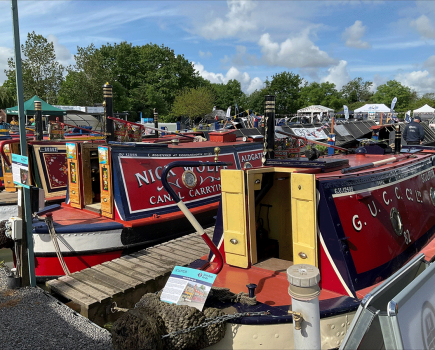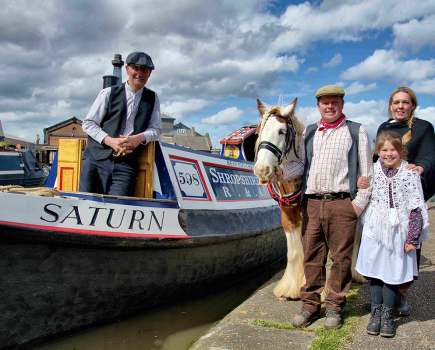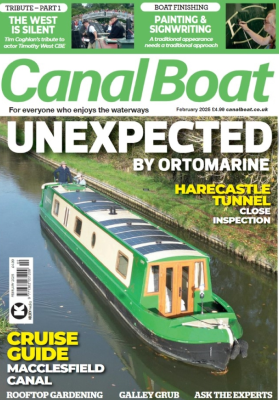Locks, bridges, tunnels, channels and towpaths are all on the agenda for Waterway Recovery Group’s restoration volunteers in 2019, as it plans a programme with a slight Midlands flavour to it…

A quick glance at the map which accompanies the Waterway Recovery Group 2019 Canal Camps booklet gives the impression that there’s something of a Midlands emphasis on this year’s planned programme of week-long working holidays volunteering on canal restoration projects. Yes, there are some far-flung projects being supported in Wales, East Anglia, Lancashire and the deep south, but there’s definitely a cluster within 40 miles or so of Birmingham.
Was that always the plan? No, when WRG, the volunteer offshoot of The Inland Waterways Association, begins planning for the year ahead, it invites canal trusts and societies all over the country to ask for camps – and puts together a programme based on matching its resources to the work that it’s offered, wherever it is. And this year the traditional canal heartlands of the Midlands will benefit a great deal from WRG’s input. But as WRG Chairman Mike Palmer puts it: “Although it might happen that our sites for this year aren’t as varied as they sometimes are, we can guarantee that the work will be very varied.”
A quick canter around the worksites serves to back up his comments about the variety of work – and we’ll start with a circuit of the outlying projects, before returning to the Midlands.

Starting in the South, the Wey & Arun is a project where WRG has been increasing its commitment in recent years as the Wey & Arun Canal Trust has expanded its activities from one main restored length through Loxwood to include to other sections of the historic route that it aims to reopen from the Thames to the South Coast. And in 2018 it began work at yet another new site, with initial clearance and towpath surfacing at Birtley. As well as a step towards full restoration, this is helping to create a network of local footpaths which will cross the canal in two places. So 2019’s Canal Camps will begin construction of the two new liftbridges to carry these paths.
The Cotswold Canals have been a favourite WRG site for many years, but at the moment the practical work has temporarily tailed off just a little because, to a certain extent, the Cotswold Canals Trust and its partners are ‘between projects’. Both the Lottery-supported restoration from Stonehouse through Stroud to just short of Brimscombe Port and the IWA-funded restoration of Inglesham Lock at the east end of the route are very close to completion, while the next major scheme – to link Stroud to the national network at Saul – awaits detailed planning and final confirmation (fingers crossed) of its Lottery money. But, in the meantime, there’s a job to do on a different section of the canal, finishing off the complete rebuilding of a traditional brick hump-backed bridge at Weymoor, and that’s WRG’s project for this year.
Moving further west, the Monmouthshire & Brecon Canals will see a very different type of camp, with the volunteers continuing an archaeological excavation of a former lock cottage on the Ty-Coch flight, in parallel to the restoration of the stone-built locks. This is part of the ‘missing link’ of just a couple of miles between the navigable length from Brecon and a restored section leading north from Newport.

Further west again, WRG’s other Welsh worksite for 2019 is on the Swansea Canal, where just six miles survive of the original 16-mile route up the Tawe valley from Swansea docks. Swansea Canal Society has long-term plans to build a brand new route involving the river, a stream, and a lake to bring the canal back to Swansea and link it to the Neath and Tennant canals, but for now the aim is to restore the five remaining locks on the surviving length. Last year, WRG helped restore the overflow bywash at Ynysmeudwy Upper Lock, enabling the canal’s water to be diverted and allowing this year’s Camps to work on repairing the stone-built lock chamber.
Heading north now, the Lancaster Canal Trust aims to rewater a short section of the dry part of the canal’s abandoned northern reaches – the ‘first furlong’ length – to demonstrate the practicality of restoring the entire line through to the original Kendal terminus. But making the canal waterproof enough to refill it will require it to be lined, and this year’s WRG camps aim to complete the installation (begun in 2018) of a watertight membrane covered with protective concrete blocks to achieve this.
In East Anglia, WRG returns to a project which it has supported for the past two years, rebuilding the lock at Geldeston, head of navigation on the River Waveney, part of the Broads. There are no plans to reopen it to navigation; rather the heritage structure is being preserved (and saved from possible collapse) and it is hoped that when restored it will provide a mooring for a historic wherry (sailing barge).
A little further south, the Chelmer & Blackwater Navigation provides a rare example of WRG’s volunteers working not on a restoration but on a navigable waterway. IWA took over the isolated navigation linking Chelmsford to the sea some 15 years ago, to save it from closing after the original company went bankrupt. But without any regular public funding, it relies heavily on volunteer support for repair and improvement – such as towpath vegetation control and maintenance, which is likely to be WRG’s work this year.
Returning now to the Midlands, and by far the biggest commitment by WRG Canal Camps for 2019 is to the Grantham Canal Society’s project at Woolsthorpe Locks towards the eastern end of the former route from Grantham to Nottingham. No fewer than seven weeks will be concentrated on Lock 14 of this seven-lock flight. As with Lock 15, rebuilt during an earlier stage of the same Heritage Lottery Fund supported programme of volunteer work, Lock 14 has turned out to be in worse condition than had been hoped. So rather than a refurbishment of the chamber, the job has turned into an almost complete dismantling and rebuild of the main chamber walls and much of the rest of the brick-built structure. And when it’s finished, there are Locks 13 and 12 to restore…
Meanwhile, on the Lichfield Canal, WRG will return to the site of their 2018 Camp and Reunion weekend at Fosseway Heath, where the Lichfield Canal Trust is rebuilding the towpath wall, relaying the towpath, and reinstating the canal channel. Initially it will form a nature reserve and local walkways, but later it will link up with a diversionary section of canal to be built alongside the Lichfield Southern Bypass road (avoiding a section that has been built on). This in turn will rejoin the canal’s original route, and a length which has already been restored on the east side of the city.
A little further east is the Derby Canal, where WRG will continue supporting Derby & Sandiacre Canal Trust’s work to rebuild Borrowash Bottom Lock, moving on from the chamber walls to the upper and lower wing walls. This is part of a length of canal east of Derby that the Trust is hoping to re-water in the not-too-distant future, as part of its long-term aim of reopening the route from the Erewash to the Trent & Mersey Canal as well as a new link to the city centre.
Lastly, the Shrewsbury & Newport Canals Trust’s long-term aim is to reopen the entire route through from the Shropshire Union at Norbury Junction to Shrewsbury – but a shorter-term project aimed at raising interest and support for this tricky restoration is taking place at Berwick Tunnel, towards the western end. The formerly completely overgrown tunnel approach cuttings are being cleared, and WRG will be helping with reinstatement of the towpath west of the tunnel, and creation of a new path on the other side of the canal, to create a circular walk based around the tunnel.
WRG Canal Camps in 2019 will therefore be supporting 11 different projects, working on stone locks, brick locks, tunnels, brick bridges, liftbridges, towpaths, channel walls, channel linings, and archaeology. It’s hard to disagree with Mike Palmer’s summary that it will be ‘very varied’!
Canal Camps are week-long volunteer working holidays open to anyone aged 18 or over (plus there are separate weekend ‘family camps’ catering for younger volunteers), and new volunteers are welcome irrespective of experience. See waterways.org.uk/wrg for details.
Image(s) provided by:
Martin Ludgate







